 ABUSED, CONFUSED, AND MISUSED WORDS A WRITERS GUIDE TO USAGE, SPELLING,
ABUSED, CONFUSED, AND MISUSED WORDS A WRITERS GUIDE TO USAGE, SPELLING,
GRAMMAR, AND SENTENCE STRUCTURE MARY EMBREE  Copyright 2007, 2013 by Mary Embree This book was previously published as The Birds and the Bees of Words: A Guide to the Most Common Errors in Usage, Spelling, and Grammar. All Rights Reserved. No part of this book may be reproduced in any manner without the express written consent of the publisher, except in the case of brief excerpts in critical reviews or articles. All inquiries should be addressed to Skyhorse Publishing, 307 West 36th Street, 11th Floor, New York, NY 10018. Skyhorse Publishing books may be purchased in bulk at special discounts for sales promotion, corporate gifts, fund-raising, or educational purposes. Special editions can also be created to specifications. For details, contact the Special Sales Department, Skyhorse Publishing, 307 West 36th Street, 11th Floor, New York, NY 10018 or .
Copyright 2007, 2013 by Mary Embree This book was previously published as The Birds and the Bees of Words: A Guide to the Most Common Errors in Usage, Spelling, and Grammar. All Rights Reserved. No part of this book may be reproduced in any manner without the express written consent of the publisher, except in the case of brief excerpts in critical reviews or articles. All inquiries should be addressed to Skyhorse Publishing, 307 West 36th Street, 11th Floor, New York, NY 10018. Skyhorse Publishing books may be purchased in bulk at special discounts for sales promotion, corporate gifts, fund-raising, or educational purposes. Special editions can also be created to specifications. For details, contact the Special Sales Department, Skyhorse Publishing, 307 West 36th Street, 11th Floor, New York, NY 10018 or .
Skyhorse and Skyhorse Publishing are registered trademarks of Skyhorse Publishing, Inc., a Delaware corporation. Visit our website at www.skyhorsepublishing.com. 10 9 8 7 6 5 4 3 2 1 Interior design by Robin Black Page composition/typography by Integra Software Services, Pvt. Ltd., Pondicherry, India Library of Congress Cataloging-in-Publication Data is available on file. ISBN: 978-1-62087-047-1 Printed in China This book is dedicated to MY GRANDSON ALEXANDER FLEISCHER who,
at almost 2, is falling in love with words. Contents A word fitly spoken is like apples of gold in pictures of silver.
PROVERBS 25:11 I s it any wonder that words are abused, confused, and misused so often when language is so incredibly complex and it comes in so many forms? Whether were teaching, conducting business, or having a personal conversation, using appropriate words is essential for clarity. Words have the power to ignite anger, inflame passions, and destroy relationships. But they also have the power to pacify, console, educate, amuse, and express love. There are many different languages in the world, which means that we do not have a common base of words to work with. The wide variations of meaning in our vocabularies create the challenge of communicating clearly with people whose language is not the only dividing factor. Their culture, philosophy, and belief systems are not like our own.
Ludwig Wittgenstein said, If we spoke a different language, we would perceive a somewhat different world. He also said, The limits of my language mean the limits of my world. Using an inappropriate word can cause misunderstandings, and misunderstandings can have serious consequences. If we want to reach our audience, we need to simplify our language and adapt our words to our readers repertoire. Simplification also makes for better writing. The German philosopher Arthur Schopenhauer said, Writers should use common words to say uncommon things.
When computers and the Internet became a major part of our everyday lives, communication moved into the fast lane. We no longer have time to waste addressing and stamping envelopes. E-mail has become a quick way to communicate and, as we dash off messages, we tend to get sloppy. Sometimes we dont take the time to punctuate, capitalize, or spell correctly, let alone use words properly. Even though were all so busy, I believe it is still important to be concerned about the quality of our writing. To quote Samuel Johnson, English author and lexicographer, What is written without effort is in general read without pleasure! The ability to speak and write well is valued in practically every field and in most business and personal relationships.
This book is intended to help you say what you really mean.  Word Usage Proper words in proper places,
Word Usage Proper words in proper places,
make the true definition of a style. JONATHAN SWIFT [16671745] IF YOU LOVE WORDS, you probably like to read a wide variety of things: novels, nonfiction books, newspapers, magazines, comic books, cereal boxes. If you read a lot, you probably write pretty well because youve seen a lot of writing and have noticed how writers put sentences together. Youve seen how words are commonly spelled and observed that most writing has a pattern to it. Most likely, you appreciate the beauty of communicating through the amazing versatility of words and want to use them to the best of your ability yourself.
The artistry of words can pull us inside a story, making us feel what the characters feel. A great novel can carry us off into another dimension, into a fantasy so engrossing that we forget all our earthly cares. A magnificent book is almost orgasmic. We want it to go on and on. Word appreciation is similar to music appreciation. The more we learn about words and music, the more we enjoy them in all of their forms: from magazines to novels, from popular music to classical.
Whether its words or music, it is communication and I believe that the better we are at it, the happier we will be. As Alexander Pope said, True ease in writing comes from art, not chance, as those move easiest who have learned to dance. Learning to write well is not so different from learning to dance well. It is much more fun when we learn the steps. Although we were taught the basics in school and have been writing most of our lives, sometimes it helps to be reminded of some of the steps involved in expressing ourselves through words. Because communication can be formal or informal, the setting or field in which one is working generally determines its nature.
Formal writing is usually used for scientific and scholarly papers, technical and business reports, and legal briefs, to name just a few. Those cases call for the current professionally accepted rules of writing. Informal writing is more suitable for commercial messages, scripts, poetry, novels, personal letters, notes, e-mail, and many other types of written communication. In such everyday writing, we might want to relax the rules a little and write more from our hearts than from our heads. That doesnt mean that we neednt be concerned with spelling and sentence structure at all. Our written communications are extensions of ourselves, which project an image of who we are.
E-mail doesnt give us license to throw all the rules out the window. Business e-mail should be as well composed as a hard copy we send through the mail. Sloppy writing is okay only in very personal messages. THE PARTS OF SPEECH Whether writing is formal or informal, our ideas come across with greater clarity when we use words appropriately in a sentence. An incorrect word can change the meaning, sometimes drastically. Consider the frequently confused words enervate and energize. If you were to say, His words enervate me, it would mean they make you tired.
If you say they energize you, you would be saying that they give you vigor. These are opposite meanings. Sentences have four purposes: to state, to question, to command, and to express surprise or other strong emotion (exclamatory). A sentence that states is called a declarative sentence. It makes a statement: I am going to the movies. A sentence that asks is an interrogative sentence: Are you going to watch the games on TV all day? A sentence that expresses a command is called an imperative sentence: Get off that couch and come with me! Thats outrageous! is an example of an exclamatory sentence. Words are classified according to their functions in sentences.
Next page
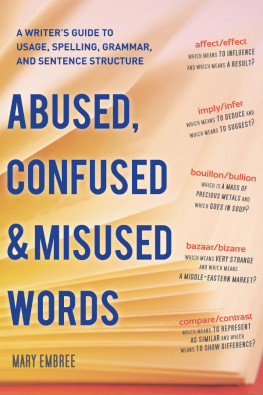
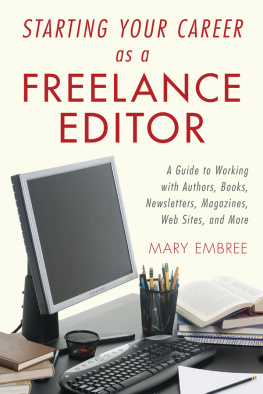

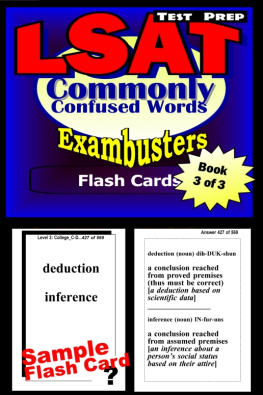
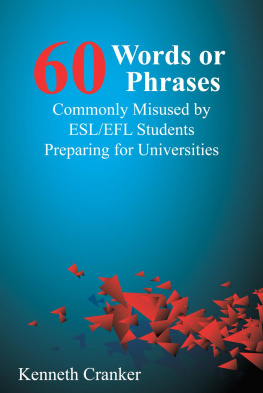
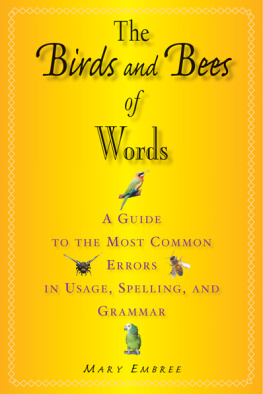
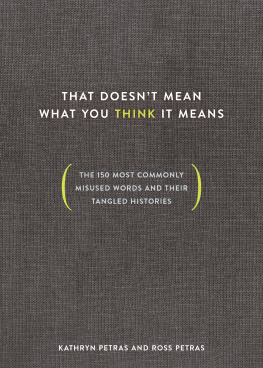
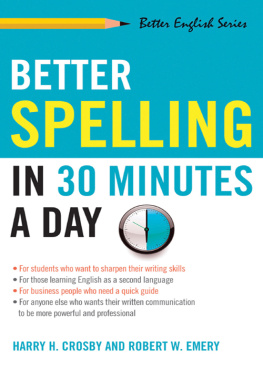
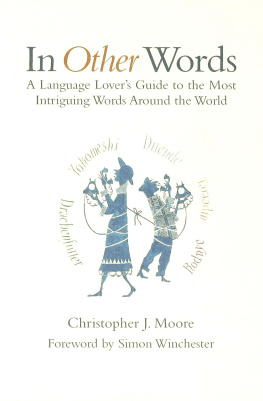
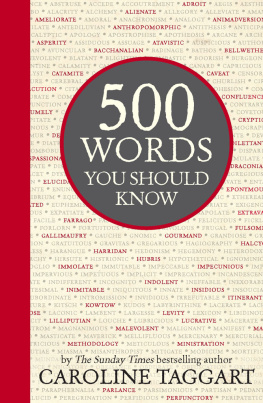

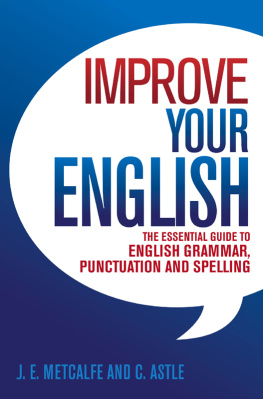
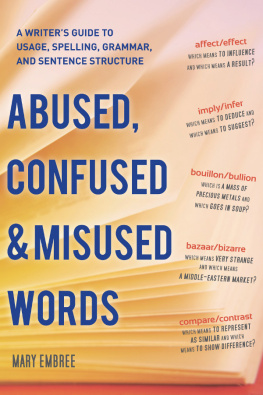
 ABUSED, CONFUSED, AND MISUSED WORDS A WRITERS GUIDE TO USAGE, SPELLING,
ABUSED, CONFUSED, AND MISUSED WORDS A WRITERS GUIDE TO USAGE, SPELLING, Copyright 2007, 2013 by Mary Embree This book was previously published as The Birds and the Bees of Words: A Guide to the Most Common Errors in Usage, Spelling, and Grammar. All Rights Reserved. No part of this book may be reproduced in any manner without the express written consent of the publisher, except in the case of brief excerpts in critical reviews or articles. All inquiries should be addressed to Skyhorse Publishing, 307 West 36th Street, 11th Floor, New York, NY 10018. Skyhorse Publishing books may be purchased in bulk at special discounts for sales promotion, corporate gifts, fund-raising, or educational purposes. Special editions can also be created to specifications. For details, contact the Special Sales Department, Skyhorse Publishing, 307 West 36th Street, 11th Floor, New York, NY 10018 or .
Copyright 2007, 2013 by Mary Embree This book was previously published as The Birds and the Bees of Words: A Guide to the Most Common Errors in Usage, Spelling, and Grammar. All Rights Reserved. No part of this book may be reproduced in any manner without the express written consent of the publisher, except in the case of brief excerpts in critical reviews or articles. All inquiries should be addressed to Skyhorse Publishing, 307 West 36th Street, 11th Floor, New York, NY 10018. Skyhorse Publishing books may be purchased in bulk at special discounts for sales promotion, corporate gifts, fund-raising, or educational purposes. Special editions can also be created to specifications. For details, contact the Special Sales Department, Skyhorse Publishing, 307 West 36th Street, 11th Floor, New York, NY 10018 or . Word Usage Proper words in proper places,
Word Usage Proper words in proper places,